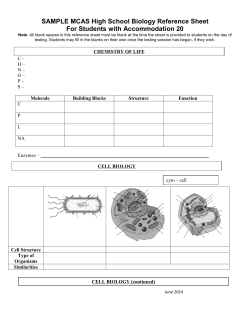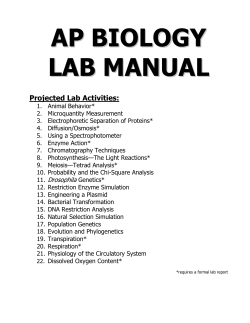
SystemsX.ch: The Swiss Initiative in Systems Biology
SystemsX.ch: The Swiss Initiative in Systems Biology 2 | SystemsX.ch SystemsX.ch: The Swiss Initiative in Systems Biology In Switzerland, SystemsX.ch is the largest public research initiative to date focusing on a particular field of basic research. The initiative promotes systems biology in Switzerland with the aim of positioning Switzerland among the world leaders in this area of research. The Swiss National Science Foundation (SNSF) monitors the quality of the initiative as a whole as well as that of the individual research projects. SystemsX.ch supports research projects on the basis of the “matching funds” principle: each institution entitled to research funds must contribute the same amount of funds from its own resources. SystemsX.ch promotes projects in six different categories (see pages 10–11). All projects are highly interdisciplinary and interinstitutional. Across the country, SystemsX.ch unites: • approximately 200 projects • well over 1000 scientists • more than 300 research groups • 13 equal partner institutions SystemsX.ch | Systems biology | 3 Systems biology – the big picture The big picture Systems biologists strive to understand living organisms in their entirety. For this purpose, they examine the composition and dynamics of cellular constituents. However, rather than concentrating on individual components, scientists examine how different elements interact – from genes to proteins and metabolites. Research with big data Systems biology focuses on the dynamics of a biological system. In order to be able to register and classify the ongoing processes, extensive quantitative data must be available. The sheer volume of this data calls for appropriate IT infrastructure, a suitable data management system and new algorithms. These are all necessary when simulating and modeling the behavior of biological systems under various conditions. Interdisciplinarity leads to success Questions formulated in the context of systems biology are extremely complex. They can only be answered by means of continuous interplay between analyses in the lab and computer modeling. Systems biology therefore depends on the intensive collaboration between experts in various disciplines such as biology, mathematics, physics, chemistry, computer science, engineering, and medicine. 4 | SystemsX.ch | Past and future SystemsX.ch: Past and future Start-up phase (2003–2007) • The Universities of Basel and Zurich and the ETH Zurich founded the “SystemsX” systems biology research initiative in 2003. • The EPF Lausanne joined the consortium in 2006. • At the same time, a similar organization called “Swiss Genomics” was established in the French-speaking part of Switzerland. Participating institutions included the Universities of Geneva and Lausanne as well as the EPF Lausanne. • In May 2006, the State Secretary for Education and Research prepared the grounds for a countrywide research initiative on the condition that Swiss Genomics and SystemsX established a common organization. • In 2007, “SystemsX.ch” was founded: the Universities of Basel, Bern, Fribourg, Geneva, Lausanne and Zurich, the EPF Lausanne, the ETH Zurich as well as the Friedrich Miescher Institute for Biomedical Research, the Paul Scherrer Institute, and the SIB Swiss Institute of Bioinformatics joined to form a nationwide systems biology initiative. Expansion phase (2008–2012) • The SystemsX.ch Scientific Executive Board defined four performance goals: -Initiation of high-quality research projects - Implementation of a multifaceted educational and advanced training program -Collaboration between public and private research groups - International networking • The Swiss Confederation contributed 120 million Swiss francs to support the initiative during its expansion phase. • The University of Neuchatel joined SystemsX.ch in 2009. • In 2012, the State Secretariat for Education, Research and Innovation, the Swiss National Science Foundation, the ETH Board and the Swiss University Conference approved the continuation of SystemsX.ch. SystemsX.ch | Past and future | 5 Consolidation phase (2013–2016) • For the years 2013–2016, the Swiss Confederation has granted an additional 100 million Swiss francs towards the establishment of systems biology research and the appropriate training of young scientists. • SystemsX.ch has set a new priority: medicine is to benefit more from systems biology. Accordingly, the calls for proposals have been adapted and a new project category called Medical Research and Development (MRD) Projects has been created to specifically promote innovative technologies for the treatment or diagnosis of diseases. • International collaborations will be continued and intensified. • By the end of the initiative, SystemsX.ch aims to have permanently anchored systems biology in the Swiss research community. Interim assessment (2013) • SystemsX.ch represents the Swiss partner institutions in the European systems biology network ERASysAPP. • At the end of 2013, the Università della Svizzera italiana (USI) joined the network. • SystemsX.ch, a broad-based initiative has established itself in Switzerland and encompasses: - approximately 200 projects - well over 1000 scientists - more than 300 research groups - 13 equal partner institutions 6 | SystemsX.ch | Well-connected SystemsX.ch: FMI Well-connected, in Switzerland and abroad Ba as as UniBas SystemsX.ch not only unites 13 equal partner institutions in Switzerland but is also well-integrated into international systems biology networks. Particularly in the European Research Area (ERA), SystemsX.ch plays an active role in the promotion of international science projects and the development of research structures in the field of systems biology. UniNE UniFR EP EP EPFL UniL U niL iL UniGE Partnership with ERASysAPP network SystemsX.ch has been an active partner in the European ERA Systems Biology Applications network (ERASysAPP) since 2012. 16 partners in 13 European countries are part of this consortium. SystemsX.ch is in charge of the education and exchange sector. Amongst other things, this includes the joint organization of summer schools. SystemsX.ch also takes part in the joint transnational calls for projects. UniBE SystemsX.ch | Well-connected | 7 Collaboration with Germany SystemsX.ch has a special agreement with the German Federal Ministry of Education and Research (BMBF) concerning projects involving both German and Swiss research institutions: SystemsX.ch forwards such RTD Project proposals, including the evaluations performed by the Swiss Panel of Experts, to the BMBF. The Ministry then decides if the German research groups will be supported within the corresponding RTD Projects. To date (as of October 2014), four RTD Projects have benefited from this agreement. PSI Z ETHZ UZH SIB Participation in a European IT project US USI Contacts with scientists worldwide SystemsX.ch researchers are in constant contact with numerous systems biology institutions all over the world, including the Institute for Systems Biology in Seattle, the birthplace of modern systems biology. In addition, SystemsX.ch manages the secretariat of the International Society for Systems Biology (ISSB), which organizes the International Conference on Systems Biology (ICSB) every year. In conjunction with the German Federal Ministry of Education and Research (BMBF) and the British Biotechnology and Biological Sciences Research Council (BBSRC), SystemsX.ch is involved in the development of the European IT support project “Fairdom – Data Management and Modeling Core” (DMMC). 8 | SystemsX.ch | Promotion of young scientists SystemsX.ch: Successful promotion of young scientists A sufficient number of suitably trained young scientists are needed to guarantee the long-term integration of systems biology into the Swiss research sector. SystemsX.ch recognized this need at an early stage and has reacted by taking several measures. Above all, these include the Interdisciplinary PhD Projects (IPhD) and the Transition Postdoc Fellowships (TPdF). In these two project categories, young systems biologists acquire in-depth knowledge in at least two different scientific disciplines (for details, see page 11). In addition, SystemsX.ch organizes and finances customized training events for young scientists, mostly in collaboration with partner organizations. These events include, among others, retreats, summer schools, and advanced lecture courses. The initiative offers young scientists an ideal platform for the presentation of their findings to a broad professional audience during the International SystemsX.ch Conferences or the annual All SystemsX.ch Day. SystemsX.ch | Promotion of young scientists | 9 “I believe that SystemsX.ch’s IPhD Projects are a unique opportunity for students like me who want to acquire expertise in several complementary fields of science. For me, it was the perfect continuation of my master studies in biotechnology.” Stepan Tymoshenko, IPhD student, EPF Lausanne “My Interdisciplinary PhD Project was a good preparation for my present postdoctoral position. I’m working again with physicists, computer scientists, chemists, and biologists. I particularly appreciate that this interdisciplinary environment stimulates creativity, that progress in research is made more rapidly and that projects are tackled in a more comprehensive way. I learn something new every day.” Dr. Andrea Mizzi Brunner, ex-IPhD student of SystemsX.ch, presently a postdoc at the Utrecht University, Netherlands “The support I received from SystemsX.ch has made the transition to systems biology much easier for me. Thanks to the opportunities for further training and my research work within the Transition Postdoc Fellowship, I gained a deep insight into disciplines which were initially unfamiliar to me. It’s clear to me that I want to continue working in the interdisciplinary field of systems biology in the future.” Dr. Roger Geiger, Transition Postdoc Fellow, ETH Zurich und Università della Svizzera italiana (USI) 10 | SystemsX.ch | Project categories SystemsX.ch: A large range of projects Research, Technology and Development (RTD) Projects … focus on quantitative biology, integrating a number of different scientific approaches including the most recent developments in theory and modeling. At least two partner institutions and several research groups representing complementary fields contribute to these large-scale projects. SyBIT, SystemsX.ch’s bioinformatics project, supports as a central service the initiative’s RTD Project groups in coping with their flood of digital data. Medical Research and Development (MRD) Projects Project duration 4 years Funds* approximately CHF 150 million Transfer Projects (TF) … are collaborations between research groups working in the academic and private sectors (industry, SMEs, hospitals, etc.). The aim of these projects is to promote knowledge transfer between academia and private institutions and to strengthen applied research in systems biology. Project duration 2 years, with optional one-year extension Funds* approximately CHF 3 million … are large-scale projects in which systems biology approaches are specifically applied to medically or clinically relevant topics. These projects involve a number of interdisciplinary research groups working in at least two different partner institutions. Project duration 3 years Funds* approximately CHF 18 million SystemsX.ch | Project categories | 11 Transition Postdoc Fellowships (TPdF) … are aimed at expanding young scientists’ basic knowledge in systems biology. Having completed their doctorates, emerging researchers switch to a new area or discipline in order to implement innovative ideas at the interface between classically separate fields. Project duration 2 years, with optional one-year extension Funds* approximately CHF 10.5 million Special Opportunities Fund (SpecOpp) Interdisciplinary PhD Projects (IPhD) … serve the purpose of training and encouraging future systems biologists. The main focus of these PhD positions is on collaboration between two different disciplines relevant to systems biology. Young scientists are therefore jointly overseen by two supervisors working in different fields. Project duration 3 years, with optional one-year extension Funds* approximately CHF 18 million … promotes projects which do not qualify for other types of funding but which have the potential to contribute significantly to systems biology research in Switzerland. Thanks to this fund, SystemsX.ch can flexibly support new projects as well as cofinance novel technologies required for existing projects. Funds* approximately CHF 1.6 million * Represents the total investment sum in this category (2008–2016). 12 | SystemsX.ch | RTD Projects SystemsX.ch: RTD Projects – cross-institutional research The MalarX RTD Project Together against malaria Malaria threatens the health of half the world’s population. Even in Europe, outbreaks of this tropical disease occur sporadically. In order to be able to develop new drugs against malaria it is important to fully understand the interactions between the pathogen and the host organism. In particular the dormant phase in the liver, characteristic of certain malaria pathogens, is still not fully understood. The interdisciplinary MalarX RTD Project team hopes to shed light on this aspect of the disease. The objective is to develop new therapeutic approaches and to thus contribute to the global eradication of malaria. Principal investigator Prof. Vassily Hatzimanikatis, Laboratory of Computational Systems Biotechnology, EPF Lausanne Participating institutions EPF Lausanne, University of Bern, University of Geneva Number of research groups 4 The PhosphoNet PPM RTD Project Fighting prostate cancer with personalized and precision medicine Prostate cancer is the most frequent malignant and third most frequent fatal cancer in men. The scientists involved in the RTD Project PhosphoNet PPM aim to establish a basis for the development of a reliable method to diagnose prostate cancer without a biopsy. If the diagnosis is positive, the researchers want to be able to predict whether the disease will take an aggressive or non-aggressive course. Furthermore, their findings will contribute to improving treatment of patients with hormone therapy-resistant prostate cancer by helping to select optimal individual therapies. Principal investigator Prof. Ruedi Aebersold, Institute of Molecular Systems Biology (IMSB), ETH Zurich Participating institutions ETH Zurich, University of Zurich, Cantonal Hospital of St. Gallen, TU Dresden Number of research groups 8 SystemsX.ch | RTD Projects | 13 The TbX RTD Project Looking into the mechanisms of antibiotic resistance In Europe alone, more than 25,000 people die every year of infections involving resistant bacteria. Also the successful treatment of tuberculosis, the incidence of which is rising in Europe, is threatened by drug resistances. Within the scope of the TbX RTD Project, scientists from various fields are investigating the development and spread of tuberculosis pathogen resistances. Principal investigator Prof. Sebastien Gagneux, Tuberculosis Research Unit, Swiss Tropical and Public Health Institute, University of Basel Participating institutions Swiss Tropical and Public Health Institute, University of Basel, ETH Zurich, BioVersys AG, Basel Number of research groups 8 The SynaptiX RTD Project Learning about forgetting Getting lost on the way home or forgetting a pan on the stove? Forgetting as a consequence of old age or of a disease is a leading cause of care dependency in old age worldwide. Researchers participating in the SynaptiX RTD Project are using fruit flies to investigate the process of forgetting at the level of the genes, the neurons, and the involved substances. The knowledge thereby gained may contribute to the development of drugs for ailments such as Alzheimer’s disease in the future. Principal investigator Prof. Simon Sprecher, Department of Biology, University of Fribourg Participating institutions University of Fribourg, University of Bern, University of Nevada Number of research groups 5 14 | SystemsX.ch | Space for innovation SystemsX.ch: Diverse projects – space for innovation TPdF Project Satellite navigation and Petri dishes Tri Thanh Pham knew all about airplanes, aerodynamics, and satellite navigation. However, this young aerospace engineer missed the link to practical applications and living organisms. That is why, in 2012, he seized the opportunity to apply for a SystemsX.ch Transition Postdoc Fellowship (TPdF). Today, he works with cells, genes, and Petri dishes at the Biozentrum in Basel. Among other things, he has developed a method to precisely locate surface measurements on living cells. This achievement was only possible thanks to the extreme interdisciplinarity of the project. IPhD Project From PhD student to entrepreneur Not even in his dreams would the engineer and mathematician Ata Tuna Ciftlik have imagined that during his Interdisciplinary PhD Project (IPhD) he would manage to develop a device designed to perform precise and rapid cancer diagnoses at low cost. But that is exactly what he achieved during his IPhD, supported by two supervisors, one working at the University of Lausanne and the other at the EPF Lausanne. Recently, he has even patented his development. In a follow-up project he is now testing his device under practical conditions in the field of breast cancer diagnostics. Dr. Ata Tuna Ciftlik, EPF Lausanne Dr. Tri Thanh Pham, University of Basel SystemsX.ch | Space for innovation | 15 TF Project University Hospital Zurich meets IBM A win-win situation as good as it gets: within the scope of the µFluidX TF Project, the pathologists at the University Hospital Zurich are testing an innovative device for cancer diagnostics developed by the IBM research laboratory in Rüschlikon. While the scientists at the University Hospital can gain new knowledge in the field of cancer diagnostics by examining tissue samples using this instrument, the developers of the device can validate their tool under clinical conditions. This technology and knowledge transfer is a prime example of a new Prof. Dr. med. Alex Soltermann, era in which collaborations between private University Hospital Zurich companies and public research institutions are specifically promoted – collaborations patients will especially benefit from in the long run. SpecOpp Project Building bridges between science and art Extremely fine structures on the surface of fir tree needles, the skin of a zebrafish, or the ocular fundus – Martin Oeggerli, scientist and artist, reveals minute structures using a special electron microscope. Moreover, he colors the pin-sharp images in a subsequent step and by doing so creates fascinating works of art. Through this SpecOpp Project he builds bridges of a different kind between science and art and thus offers non-professionals insights into the magic world of nature. Dr. Martin Oeggerli, University of Basel 16 | SystemsX.ch | A positive response SystemsX.ch: A positive response “The questions formulated in systems biology are multileveled and complex. This is why every research project requires a team of experts from different fields who complement each other – independent of the institution they work for. For this reason, SystemsX.ch specifically promotes interinstitutional projects successfully. As proven by the fact that to date, we have united more than 1000 scientists from all 13 partner institutions in approximately 200 projects.” Dr. Daniel Vonder Mühll, Managing Director, SystemsX.ch “SystemsX.ch has been a unique research initiative in Switzerland, with its focus not on a specific topic but on stimulating a new scientific approach in biology research. This required interdisciplinary teams and new infrastructure, which has propelled forward molecular life science research in Switzerland. I believe this type of research stimulation could serve as a model for new Swiss initiatives in other disciplines where a paradigm shift is required.” Professor Lucas Pelkmans, University of Zurich, Chairman of the Scientific Executive Board of SystemsX.ch SystemsX.ch | A positive response | 17 “Working in partnership with systems biologists is essential for physicians. It allows the collection of large quantities of clinical and epidemiological data and their analysis by way of mathematical models. Personalized medicine can especially benefit from these multifaceted analyses, as they allow a more individualized examination of the patient.” Professor Dr. med. Jürg A. Schifferli, head physician, University Hospital Basel and member of the Scientific Executive Board of SystemsX.ch “One of the most important contributions SystemsX.ch has made has been the promotion of interdisciplinarity and with it the acceleration of this trend within biological research. This is likely to influence research in general, regardless of the specific field.” Professor Nouria Hernandez, project leader of the RTD Project CycliX, University of Lausanne “I think that SystemsX.ch was instrumental in speeding up the adoption of many technologies and quantitative approaches in experimental laboratories. This, in turn, had an effect on the types of problems that are addressed and the way in which they are studied.” Professor Mihaela Zavolan, project leader of the RTD Project StoNets, University of Basel Contact Dr. Daniel Vonder Mühll Managing Director SystemsX.ch Clausiusstr. 45 CH-8092 Zurich Phone: +41 (0)44 632 78 88 daniel.vondermuehll@systemsx.ch Visit our website: www.systemsx.ch Subscribe to our newsletter: communications@systemsx.ch Imprint Issued: October 2014 Concept: Matthias Scholer Texts and editing: Maja Schaffner, Matthias Scholer Graphic design and layout: Ruedi Widmer Grafik, Winterthur Photographs: Cover and full-page photographs: Martin Stollenwerk, except p. 6 & 7: Matthias Scholer; portraits p. 9: David Schweizer, Bas van Breukelen, Maja Schaffner; portraits p. 14: Matthias Scholer; portraits p. 15: Norbert Wey, Pablo Wünsch Blanco; portraits p. 16: David Schweizer; portraits p. 17: David Schweizer (1), Matthias Scholer (2 & 3). Partner institutions of SystemsX.ch
© Copyright 2025










